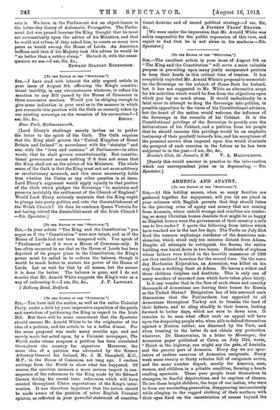[To THE EDITOR Or THE "SPECTATOR. "] SIR, — I have read
with interest the ably argued article in your issue of August 9th affirming the King's constitu- tional inability, in any circumstances whatever, to refuse his sanction to any Bill passed by the House of Commons in three successive sessions. Would you be obliging enough to give some indication in your next as to the manner in which you reconcile this position with the Oath so recently taken by our existing sovereign on the occasion of his coronation F—I
[Lord Ebury's challenge merely invites us to prefer the letter to the spirit of the Oath. The Oath requires that the King shall govern the "United Kingdom of Great Britain and Ireland" in accordance with the "statutes" and also with the "laws and customs" of Parliament—in other words, that he shall govern constitutionally. But constitu- tional government means nothing if it does not mean that the King shall act on the advice of his Ministers. The whole sense of the Oath is that the King must not act as an arbitrary or revolutionary monarch, and this sense necessarily holds true whether the Union or any other question is at issue. Lord Ebury's argument would apply equally to that portion of the Oath which pledges the Sovereign " to maintain and preserve inviolably the settlement of the Church of England." Would Lord Ebury seriously maintain that the King ought to plunge into party politics and veto the disestablishment of the Welsh Church ? Or does he condemn Queen Victoria for not having vetoed the disestablishment of the Irish Church ? —ED. Spectator.]


































 Previous page
Previous page